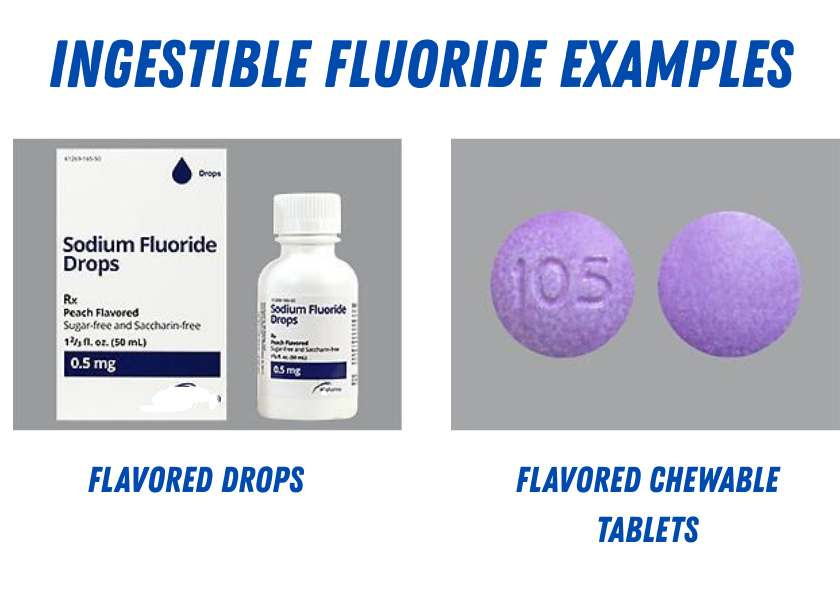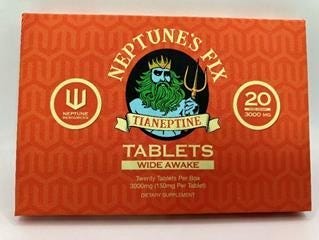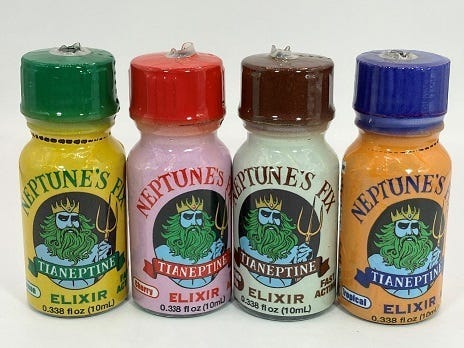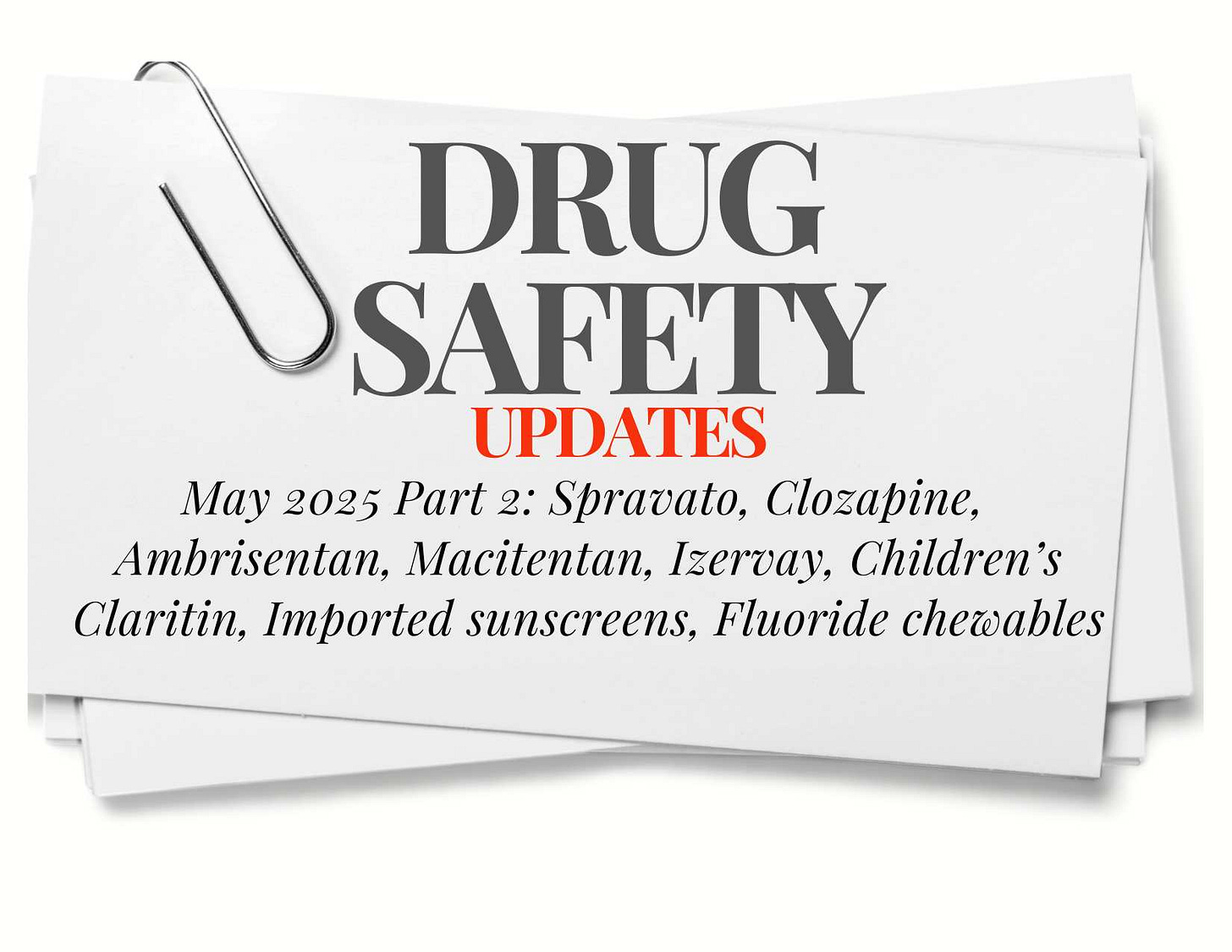May 2025 Safety Update Part 2: Spravato Antidepressant, Clozapine, Ambrisentan, Korean Sunscreens, Children's Claritin, "Gas Station Heroin," Fluoride Tablets, Medication Tips
Spravato (esketamine) Nasal Spray and Arrhythmia
Spravato (esketamine) nasal spray is a psychedelic (mind altering) treatment for very severe depression in patients who are suicidal or whose depression is severe and treatment-resistant. It may be used in conjunction with oral antidepressants or taken as a standalone treatment, administered once or twice a week. The medication is only available through a restricted distribution program called the SPRAVATO® REMS because of risks of sedation, dissociation (emotional detachment), and respiratory depression. The medication is only administered in a certified healthcare setting where the patient can be monitored for at least two hours after administration.
The label was updated to add the adverse reaction bradycardia (where the heart beats slower than normal, involving a resting heartbeat of less than 60 beats per minute). Bradycardia is a type of arrhythmia, or irregular heartbeat. Ketamine was approved in 1970, while the Spravato formulation (esketamine) was approved in 2019.
Read more about types of irregular heartbeats at MedLine Plus: https://medlineplus.gov/arrhythmia.html
FDA letter approving the safety update
Last year, Spravato received an expanded approval.
FDA Discontinues "REMS" drug safety programs for Clozapine, Ambrisentan, Macitentan
REMS (Risk Evaluation and Mitigation Strategy) is a drug safety program that the US Food and Drug Administration (FDA) requires for certain medicines with serious safety concerns, such as drugs that may cause birth defects or pose extreme risk to a patient if not taken strictly according to instruction. Three drugs recently had their REMS requirements discontinued.
Some in the health care community are concerned that due to FDA job cuts, REMS discontinuations are happening that shouldn’t, or are slow to be communicated. Chemical and Engineering News reports that “pharmacists say some safeguard programs for risky medications have stopped, basic information about others is unavailable.”
https://cen.acs.org/safety/drug-safety/FDA-job-cuts-hinder-drug/103/web/2025/05
Clozapine tablets
Schizophrenia drug clozapine’s REMS aimed to reduce the risk of severe neutropenia (low white blood cell count). Its REMS required that prescribers report results of absolute neutrophil count (ANC) blood tests before pharmacies dispensed clozapine. But this requirement was sometimes a barrier to treatment among low income or homeless mentally ill patients, and a major reason for the REMS discontinuation. Warnings about neutropenia remain on the drug label, and prescribers should still be aware of and monitor for this side effect. Clozapine was approved in 1989. It is available as a generic and by the brand name Clozaril.
Clozapine REMS announcement
The REMS had been in effect since 2015, but for years, advocates for its removal have suggested that the safety requirements did more harm than good. A recent opinion column in “The Hill” says that “the Risk Evaluation and Mitigation Strategies (REMS) program has been largely responsible for the underprescription and underuse of clozapine, the only FDA-approved drug for treatment-resistant schizophrenia, the most severe form of the disorder.”
The Hill: “Is the FDA contributing to the homelessness crisis?”
Patient experiences with Clozaril (clozapine) at Ask a Patient website
Ambrisentan and Macitentan tablets
The FDA also discontinued the REMS for ambrisentan (Letairus brand name) and macitentan (Opsumit brand name). These are drugs used to treat high blood pressure in the lungs, or pulmonary arterial hypertension and the REMS was set up to mitigate the risk of fetal toxicity. Ambrisentan and macitentan continue to have boxed warnings about the risk of birth defects and both are contraindicated during pregnancy. Females of reproductive potential should get a pregnancy test before starting the drug and use effective contraception before, during, and for one month after treatment.
FDA letter removing Ambrisentan REMS
Macitentan REMS removal announcement
Removal of Dyes from Children’s Claritin
Children’s Claritin chewable tablets (10 mg and 5 mg) for allergies will soon be “dye-free,” according to documents filed with the FDA and a letter approving of Bayer’s new packaging. Currently, grape flavor gets its purple color from FD&C blue No.2 and D&C red no. 27.
FDA letter: accessdata.fda.gov/drug…
Fluoride Tablets and Drops to be Banned
The FDA announced that it plans to study the health impacts of ingestible fluoride, such as chewable tablets and drops used by young children to help prevent tooth decay. It will move towards a ban on the products, which have never been FDA-approved in the first place. This ban would not include rinses, toothpastes, or non-ingested fluoride. “Fluoritab” cherry flavored chewable sodium fluoride tablets and flavored fluoride drops pictured below are examples of the products.
For ingestible sodium fluoride products, such as the chewable tablet pictured below, the label states: “DISCLAIMER: This drug has not been found by FDA to be safe and effective, and this labeling has not been approved by FDA. For further information about unapproved drugs, click here. “
FDA Press Release on Fluoride Product Concerns

Izervay and Syfovre Marketing Tactics
Syfovre (pegcetacoplan) and Izervay (avacincaptad pegol) are solutions injected directly into the eye as a treatment to slow the progression of an eye disease called geographic atrophy (GA). Lackluster sales, likely due to the reluctance of ophthalmologists to prescribe these new drugs, could be behind the recent surge in direct-to-consumer advertising for the products.
Investigative journalist Martha Rosenburg’s “Repetitive Drug Ads Raise Questions in Chicago Market” points out serious safety and effectiveness concerns along with marketing contradictions in the Izervay ads.
Why opthamologists are hesitant to prescribe the treatments for GA:
Global Newswire: “Treating Geographic Atrophy Remains a Tough Call for Ophthalmologists as They Voice Hesitancy to Prescribe Complement Inhibitors”
So far, the two GA drugs have not been approved for use in any country except the U.S. Both Izervay and Syfovre were approved by the FDA in 2023.
Pros & Cons of Korean Sunscreens
Korean skincare products, including sunscreens, have become very popular in the U.S. in recent years. Here are some of the reasons people are buying them, along with some potential concerns, according to Consumer Lab, a provider of independent laboratory test results for health and nutrition products.
Pros:
1. Lightweight formula is reported to be more comfortable than many U.S. sunscreen products and is absorbed by the skin like a light moisturizer.
2. Appears to provide better UV-A protection than U.S- made sunscreens, which only are rated for UV-B protection. UV-B sun rays cause sunburn, but UV-A rays can also be damaging to skin and lead to premature aging. According to Consumer Labs, the EU and Korea require sunscreen products to have protection against UVA radiation that is at least one-third of the sun protection factor (SPF) for UV-B, while the US only requires "some" UVA protection (referred to as “broad spectrum” protection).
Consumer Labs says that other than zinc oxide and avobenzone, most sunscreen ingredients allowed in the U.S. have not demonstrated strong protection against UVA rays.
Cons:
1. Since they aren’t regulated as strictly as those made in the U.S., some products may not provide the amount of UV protection claimed on the labels.
2. Popular Korean sunscreen products, such as Beauty of Joseon’s Relief Sun: Rice + Probiotics SPF50+ PA++++, are not sold in the U.S. as the products contain unapproved UV filters. Relief Sun and others may be purchased on international shipping sites, but Consumer Labs says the products may not be authentic.
Concerned about getting enough Vitamin D from the sun while you use sunscreen? Research has found that even with sunscreen use, your skin will still absorb enough sunlight to produce Vitamin D.
https://www.consumerlab.com/answers/cancer-causing-compounds-benzene-benzophenone-in-sunscreen/carcinogens-sunscreen/#korean-sunscreen-concerns
(Note: a subscription to Consumer Labs is required to read the linked article, which also contains information about benzene levels for specific sunscreen products available in the U.S. In general, spray sunscreens are far more likely to contain benzene than lotions, but not all tested spray sunscreens had dangerous levels of benzene.)
Did you know? The FDA regulates sunscreens as nonprescription drugs.
New Warning about “Gas Station Heroin,” or Tianeptine-Containing Supplements
FDA released a new warning about dangerous products containing high amounts of tianeptine. These products, known as “gas station heroin,” are sold as health supplements or “cognitive enhancers” at convenience stores in gas stations and convenience stores. The ingredient is not approved in the U.S. but is contained in certain antidepressants in other countries at much lower concentrations. A year ago, specific products, including “Neptune’s Fix,” sold as a pill or powder that is combined with water into a drink were under recall.
Adverse effects can include seizures, loss of consciousness, interactions with other medications, and more. Read FDA commissioner Martin Makary’s warning letter for more about products to avoid.
"Gas Station Heroin" Warning and Recall from Ask a Patient newsletter, April 2024.
Just in: “A landmark event in medicine was reported this week that has implications well beyond its likelihood of saving a baby’s life. Until now, commercially available CRISPR genome editing (Casgevy) was not capable of directly fixing a genomic defect.”
Read why Eric Topol is excited about this breakthrough in Ground Truth’s “The First Human to Undergo In Vivo CRISPR 2.0 Personalized Genome Editing”
Medication Tips:
This week, Dr. Lucy McBride, writer of “Are You Okay?,” answered questions from women and men about hormone replacement therapy:
A 58-year-old man with “lower end of normal” testosterone levels asks if he should consider testosterone therapy
Did you miss the last drug safety update? Check out:
Visit us at AskaPatient.com for medication and vaccine ratings and reviews provided by patients along with more news and health information.





